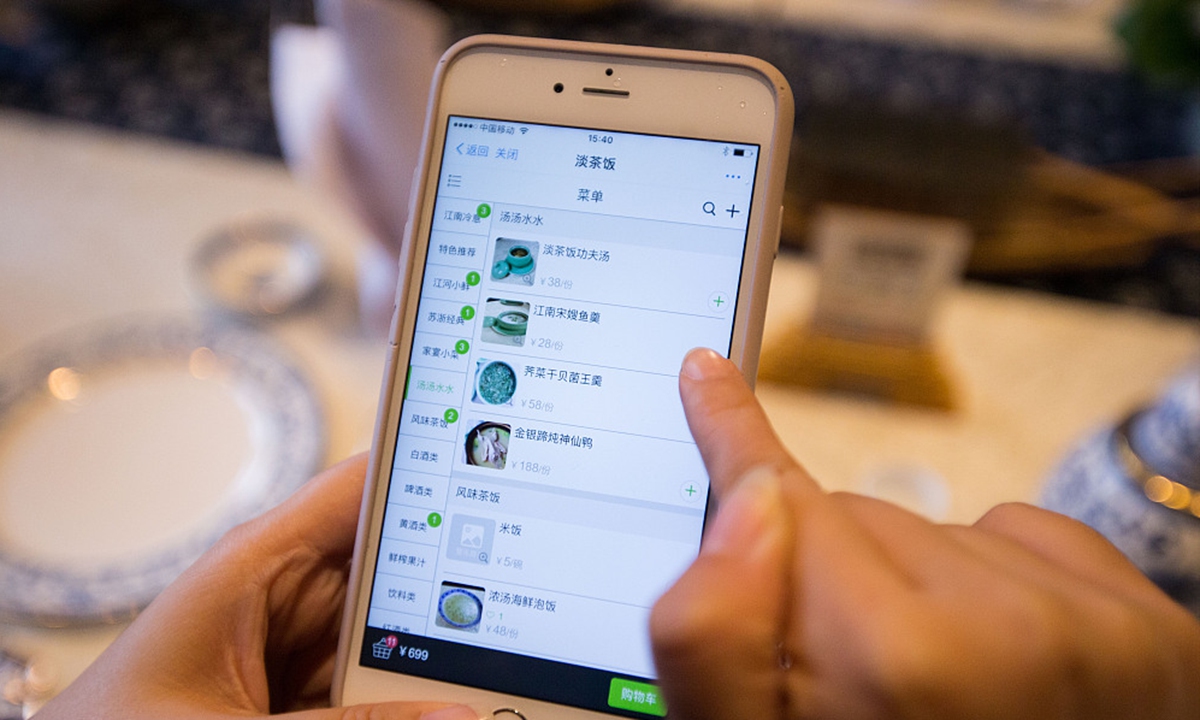
Photo: VCG
As digital food ordering has become increasingly adopted by restaurants in China, some restaurants are starting to require diners to order food only through QR code-based digital menus, which has drawn complaints from customers who prefer more traditional services.
Experts said restaurants implement digital food ordering in order to cut labor costs and promote "non-contact service" in the post-epidemic era, but it should not be the only option for diners and it may cause losses for the restaurants by driving away some customers.
The “scan to order” mobile application that most of the restaurants have allows users to browse a digital menu, send orders directly from the mobile phone and make payments on it. Users scan the QR code attached to each dining table and have the digital menu loaded on their phones.
“The mobile ordering service is an aspect of the fast-developing digital economy, and ensures safety in restaurants during the epidemic,” Yao Zhiyong, an economics professor from Fudan University, told the Global Times on Sunday.
But he also noted that limiting the ordering options to digital systems will not benefit the restaurants in the long run as the mobile ordering system also has problems.
A survey on Monday on Chinese social media site Sina Weibo about why people are reluctant to order food through digital menus found that the top three reasons were “hate to follow the commercial account of the restaurant,” “worry about personal information disclosure” and “unfriendly to non-phone holders.” A total of 38,000 people responded to the survey as of press time.
The “scan to order” mobile application that some of the Chinese restaurants use requires customers to follow the official account of the restaurants which then often send commercial messages to followers.
Some other applications require users to first register as a member, allowing the platforms to obtain their personal data, including name, phone number and location.
Su ran, a Beijing-based college student, is one of the opponents of the “scan to order” service at restaurants. He said he has followed dozens of commercial accounts of the restaurants he has been to in his WeChat and the nonstop messages from them have “become a burden” for him.
Another Shanghai resident, surnamed Chen, expressed her worries about the potential for personal information leakage in the membership registration required by the digital ordering system. “Our personal information collected by the restaurants might be used not only by themselves, but also sold to other businesses for big data analysis,” she said.
For people who are not digital savvy or do not use smartphones or mobile payment, the problem is even bigger as they are facing fewer restaurant choices.
Consumers should have more choice in ordering food, either through a waiter or digital menus, said Chen Yinjiang, deputy secretary-general of the Consumer Rights Protection Law Research Society of China Law Society, in a People’s Daily report.
Chen said it was understandable for businesses to employ the mobile ordering service, but they should not abuse it or make it the only option for diners.
